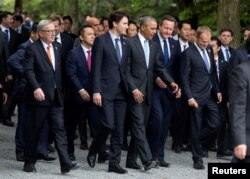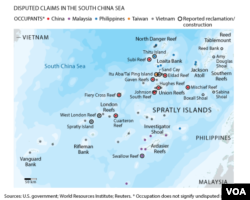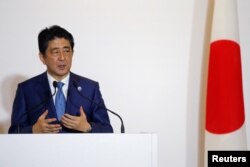China has warned the Group of Seven (G-7) countries against holding talks that it argues could worsen tensions in the South China Sea. Maritime disputes are one of a host of issues that leaders of the seven countries are expected to discuss during their meetings in Tokyo this week.
U.S. President Barack Obama, speaking at the opening of the G-7 Summit in Japan on Thursday, said the G-7 leaders intend to cover the South China Sea along with other international issues of the day.
"We begin to touch on some of the key security issues that are important to all of us. South China Sea and maritime security." he said.
Last month, the G-7 foreign ministers issued a joint statement on maritime security at the conclusion of their meetings, voicing their concern about the situation in the East China Sea and South China Sea.
Taking sides
Although the statement did not mention China specifically and called on all nations to refrain from artificial island building in the South China Sea, Beijing reacted strongly by accusing the group of taking sides.
In the run up to this week’s meetings in Ise Shima, where the issue is likely to come up again among a host of other topics, Beijing has been proactive in its opposition and commentary.
On Thursday, at a conveniently timed special briefing, Foreign Minister Wang Yi also had a chance to weigh in on Beijing’s concerns.
When asked if the G-7 summit was a good place to discuss the South China Sea issue, Wang said that was something for the heads of the G-7 nations to decide.
"We believe that no matter what the topic is, they should all adopt impartial and fair positions, and not apply double standards or strike alliances, and especially not take actions to escalate or provoke regional tensions," he said.
Wang Yi held a briefing on Thursday to mark the 100 days before China hosts the Group of 20 nations or G-20 summit in Hangzhou this September.
Ulterior motives
Meanwhile, an article in the official state-run Xinhua news agency was more pointed in its criticism, accusing the G-7 of having ulterior motives in discussing maritime disputes.
"The G-7, in order not to become obsolete and even negatively affect global peace and stability, should mind its own business rather than pointing fingers at others and fueling conflicts," the article said.
At a press briefing on Wednesday, China’s Foreign Ministry spokeswoman Hua Chunying said Japan has been overly hyping the issue and resorting to “little tricks” as it hosts the meetings, which she added should be focused on global economic governance and cooperation.
“We think Japan’s dereliction is not only a disservice to the G-7 Summit, but also harmful for maintaining peace and stability in the South China Sea,” Hua said. “It is just another poor performance of Japan aiming to deliberately defame China. I believe everybody is very clear about this."
Massive buildup raises eyebrows
Over the past few years, China’s actions in the South China Sea have thrust it into the international limelight. And while Beijing has long argued that its intentions are good and peaceful, it’s massive buildup of artificial islands in the disputed waters, which include airstrips and military facilities, and claim to almost all of the South China Sea have been a growing point of concern.
The Philippines has challenged that claim, Beijing’s so-called nine-dash line, in an international court and a ruling in that case is expected in the coming weeks.
China argues that disputes between claimants should not be handled through international mediation, but bilaterally between nations with claims in the South China Sea.
At the same time that state media and officials have been critical of the G-7’s role in “hyping” maritime disputes, Beijing is highlighting the need for the G-20 to take a more decisive lead in managing global economic challenges.







